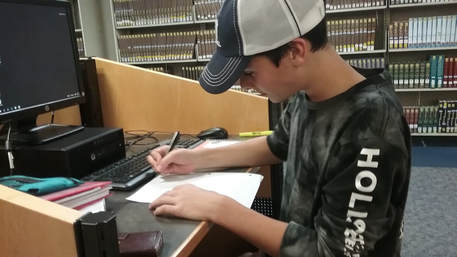 By Margaret Zheng When we were children fresh in elementary school, reciting the ABCs and 123s, drilling sight words and “math facts,” singing “Oh yes, it’s cool to be in school,” we learned not only about reading and arithmetic, but also about learning itself. Not long after our first day of classes, we mastered our first lesson: school = education. We went to school to learn, and we learned by going to school. Now after eleven years of the toils and tumults of public schooling, I find this axiom of young people’s lives to harmfully mislead. Yes, we study and learn in school, and yes, schooling is a measure of the capability employers demand of their new cohorts. But we experience and learn, play and learn, and even study and learn, outside of school, and we grow as persons outside of school. School is a part of our education, but our education must transcend school. From grades K-12, national and state bureaucrats drop upon students’ and teachers’ shoulders much of what we’re schooled on. Our schooling is largely fixed -- and faulty. Why do we learn labs but not research? History, but not civic engagement? Essays, but not tweets, not TV? Algebra, but not computers, not cryptography? To those lucky to have the power to make schooling more conducive to a holistic, practical education, I plead that you openly and kind-heartedly join in dialogue with us Americans on this critical issue and set aside political loyalties to take action that truly serves our children. But to you life-long students, youths and adults alike, I plead that you not wait patiently for the rumble of the engine of change, but rather venture in your fiery, lonely, human spirit to forge your own education and form your own active, purposeful person from that education. Let this popular quote, derived from Grant Allen’s writings but often misattributed to his contemporary Mark Twain, be your maxim: “I have never let my schooling interfere with my education.” Don’t restrict your perspective of academics to the “what”s and “how”s of schooling. All we study in school breathes in the wider world, even if choked in the musty classroom. Let your formal studies urge you to break out of asphyxiation and explore. School presents a limited, sometimes lifeless, view of the intellectual arts, which are in reality not so well-defined as biology and language arts and history and geometry, but are interwoven in humanity’s shared confrontations with the games of thought and the pains of experience. Mathematics most beautifully and most horrifyingly demonstrates the wide gap between school study and real-life practices, and I do not just mean the lack of lessons on taxes and budgeting. Derived from the Greek root meaning “to learn,” “mathematics” is more than the study of numbers or shapes, or even of music or astronomy or games or knots. Math, the language of logic, supports and permeates all other areas of study, inviting us to not only reason precisely, but also problem-solve intuitively and to consider openly. We all know that science and mathematics are nearly inseparable, but we may overlook that economics and music and architecture are also tied into math. Similarly, the complex grammar of language and the intricate arguments of essay-writing are not so difficult for one well-practiced in math, and the linguistic training we all receive from early childhood empowers us all to master this subject often falsely believed to rely on rare genius. And as language developed throughout history in contrasting cultural contexts and thus in varied but analogous forms, mathematics evolved not steadily and linearly but in intermittent bouts of strife and success. Varied civilizations used myriad number systems and approaches of study to this most essential of topics. In fact, English is not the universal language; math is. Some scientists even speculate that if there were intelligent aliens, they and we would find each other through mathematical signaling. A world well-versed in mathematical reasoning, the ability to combine “educated guesses” and rigorous logic to solve a problem, is a world intelligent and empathetic, willing and able to consider new, potentially improved, ideas and to detach from anger and frustration to collaboratively seek out the good and the true. If I did not mention your favorite subject or activity, I encourage with all the great force of a newspaper article that you look up and explore its connection to mathematics, because your appreciation of your passions is incomplete without consideration of mathematics. Just as we read to open our minds to new worlds, even if we despise our vocab and grammar books, we “math” to unlock tantalizing new ways of thought, those we can’t access with words alone, even if we’re dizzied by formulas and fractions (or decimals, especially the non-terminating kind. Ugh!). Of course, I could exhort you with my deafening soprano scream, and you would still lose your opportunity to make yourself through learning, if you did not in turn demand yourself to face what historically has disinterested you and seek a creative way to interest yourself in it and grow through it. Mathematics is only one possible target. I “learned” government and politics in school social studies classes, but I never found them relevant to me until I crossed them with my passion for psychology and education. I then exercised my own civic rights by attending and testifying at School Board meetings and writing op-eds in this newspaper. You can’t learn everything, and some say you shouldn’t try, but I insist that concerning the basic competencies, your ignorance is your dangerous vulnerability in our tempestuous twenty-first century. Students, children in heart and mind, we have a choice whether to accept our societal and social obligations to learn what others tell us to learn, to do what others tell us to do. But whether we accept or rebel, we still have a personal obligation to learn what we must learn, to make ourselves who we must be. What is must? I’ve torn myself to tears at the existential unknown, but I have reached one conclusion: You know better than I what must is for you. Teach me. Teach yourself.
0 Comments
 Courtesy of Maya Shavit Courtesy of Maya Shavit By Maya Shavit It’s midnight on a Thursday. You have just completed a deluge of difficult homework, and you are about to go to sleep when a wave of terror washes over you like a strong tide slapping against the shore. You forgot to study for that massive Algebra test you have tomorrow! One way or another, all students have had a moment of panic where they completely forget about a topic and then do poorly on an important exam. Much of this stress is attributable to poor or weak study habits that we have developed over time. Luckily, it is never too late to study smarter by studying in an organized manner, challenging oneself to the greatest extent, and finding unique ways of retaining important concepts. It is crucial to remember that studying does not happen in one night. Honors and AP science teacher Kathleen Brennan suggests that we should allot specific times to our studies and make sure that studying is a part of our daily routines. One way to start is that we can process and review information the minute a new topic has begun. Allowing yourself to have dedicated time to digest information outside of the natural learning environment is important. To understand information, you should try to explain all concepts, ideas, and aspects to anyone unfamiliar with the topic and make him understand it. In essence, practice teaching others. In addition to that thought, you must challenge yourself to understand the material. Social studies teacher Colleen Stephenson believes that a student’s most valuable studying tip is to challenge and review. Students should “review class notes daily and … not wait till the night before the test taking process to make sure that as questions arise all throughout the unit, questions can be asked.” By asking questions and prompting new thoughts about subjects, students can develop a deeper understanding of the topic they are researching. Questions about ideas will always help students conceptualize ideas more deeply and to understand more fully. As a final strategy, personalize your studying. Each person’s mind is wired differently especially in the way it understands concepts, so one must find what works for him/her. Freshman Allison Zhu takes some help from her father to personalize her studying: “My dad in order to effectively explain a math concept puts it in fandom term, for example, Harry Potter, and explains it to me in Harry Potter terms. So if he is trying to explain to me a system of linear equations, he’ll say, ‘Harry Potter goes to the bank and deposits 5 galleons on the first day every day after that six galleons. Voldemort does the same thing except he first deposits ten galleons.’ And that is how he will get me to remember math terms.” You can personalize in similar ways by drawing a doodle or making a parody of a song. The key is to find the best personal learning strategy, no matter how absurd it may seem to another student. Remember that learning is yours. In conclusion, strive to organize, work on consistently challenging material, and find the method of studying that works for you. Then, apply all of your effort in whatever method of preparation you choose. If you internalize and apply the new information, you will hold onto it much longer.  By Shiva Peri The doorbell rings. A homeowner opens the door to children who chant, “Trick-or-treat.” The phrase is more of a statement that seems strange as it originated as a question. Trick or treat? The majority of people lean to the latter. Perhaps this bias came to be because of how much easier it is for marketers to sell candy as opposed to… well, what exactly is a ‘trick’ in the context of Halloween? Nevertheless, Halloween has been sullied in recent years by two disturbing phenomena: elderly treaters and lazy costumes. Trick-or-treating (or the more accurately named treating) remains the centerpiece of Halloween. Children of all ages revel in heaps of saccharine goodness, which literally come in “fun-sizes.” But perhaps the keyword here is children. Most households are perfectly happy to supply adolescents with candy. But at what age does begging for candy become just crude? If an adult without children came to your door on Halloween, would you give him candy? Would the rarity of the occurrence make it an awkward exchange? Some people believe that one is never too old to beg for candy that he or she does not deserve. But considering the amount of work it takes to go door-to-door and get 1-2 pieces of candy, it would seem far more effective to just buy candy in bulk quantities. Really, though, trick-or-treating is too immature and too unhealthy to carry on into adulthood. Consuming large sums of sugar without restraint is a childish notion. Another complication that arises out of this popular festivity is the costumes of trick-or-treaters. Many parents of toddlers dress up their kids solely to take pictures to share on social media. Often, children dress up as Disney characters and wear generic costumes that require no thought or creativity. Teens may be even worse in the laziness of their costumes. Should you get candy for wearing larger glasses or a t-shirt with a hastily drawn skull-and-crossbones? Is a costume even necessary on Halloween? Would you give candy to a trick-or-treater without a costume? This Halloween, let’s set some ground rules:
 By Shiva Peri In my current endeavors as a junior meticulously approaching the college process, I have been thinking about the definition of intelligence quite frequently. Throughout this work, I intend to answer the following three questions: 1) What exactly is intelligence? 2) How do we measure intelligence? 3) How does society value intelligence? 1) A quick Google search will yield an immediate, yet unsatisfying answer: 1. the ability to acquire and apply knowledge and skills; 2. the collection of information of military or political value. One reason this answer is so lacking is that it is too general. Intelligence means much more than that. An idea that modern society holds dear is that education is the way to become intelligent. Consider Bloom’s taxonomy, a classification system for the stages of learning. Memory, understanding, and application (in other words, the Google definition) only cover the bottom three tiers. The abilities to analyze, evaluate, and create we find only at the top. But the question remains unanswered. Where does intelligence fit into said spectrum? Perhaps intelligence is not a result of education but a consequence of experience or common sense. If we regard intelligence in this sense, then we can place the concepts of intuition and drawing connections under the umbrella of intelligence because those skills develop with experience. However, these definitions have a bias towards the cerebrum and exclude the cerebellum. Physical abilities such as hand-eye-coordination are also forms of intelligence. However, even these ideas are biased towards humans. Many other primates possess some form of intelligence or ability to learn. Thus, we narrow our question: what exactly defines human intelligence? After a few months of contemplation, I believe that what makes human intelligence so special is our insatiable curiosity and our drive to find the answers to our questions. The diversity in how each human thinks, reasons, and feels all define his or her intelligence. Intelligence is not only defined by the traditional intellectual idea but also entails dexterity, emotional, and artistic intelligence. 2) These various definitions, though, do not all match how the majority of important institutions measure intelligence: grades, IQs, standardized test scores. The first of said means is grades. While grades are an adequate measure of intelligence, they do not reflect everything. Often, good grades are merely a result of participation, completion, and memorization. Another idea that may measure intelligence is IQ (Intelligence Quotient). IQ essentially determines how good one is at grasping a concept. Again, the test has its flaws. Quantifying intelligence with a number makes intelligence seem entirely one-dimensional, which the answer to the first question clearly disagrees with. Standardized tests are another prospective measure of intelligence, typically assessing general literacy and basic mathematical skills. While these tests may be helpful for colleges and job employers to quickly evaluate a candidate, they cannot represent the complexities of how intelligent one is and how he or she thinks. 3) The final question has the most applicability to our lives. Living in the information age, we can access knowledge relatively universally. In addition, society seems to rely entirely on the education systems to produce apt employees. The ambiguous notion of what makes a candidate “apt” is what inspired my thoughts in the first place. The notion that employers expect students to have perfect GPAs and SAT scores and to participate in several extra-curriculars may disillusion many young people. In trying to be the ‘perfect applicant’ or ‘perfect candidate,’ people constantly fear failure, never take risks, and most importantly, lose the curiosity that drives their intelligence. If intelligence is what we defined earlier, then we must remember to cultivate all forms of our intelligence or risk becoming one-dimensional. |
Archives
February 2022
Categories |
 RSS Feed
RSS Feed
